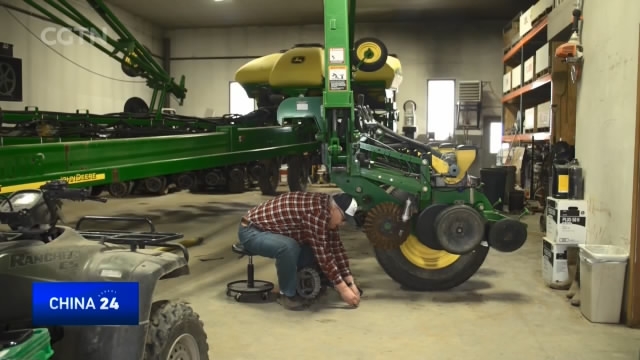
21:45, 11-Apr-2018
China-US Trade Frictions: How are farmers in China's major grain production region reacting?

Our reporters Guan Yang and Dan Williams tell us how farmers in the world's top two economies are viewing the entire situation. The agriculture industries on both sides say they fear more tit-for-tat measures.
It is the time of year for corn farmers to get to work. Seeds and fertilizers must be prepared well in advance for the spring ploughing season. Prices have always been the top concern.
ZHAO GUOMING FARMER "This year's price for corn seeds is stable, and for fertilizers, the price has gone up slightly."
Figures from the US Department of Agriculture show that -- in 2016 -- more than 20 percent of the country's agricultural produce was sold to China. In particular, no country's appetite for soybeans compares to China's. In terms of corn imports, countries like Brazil and Argentina are already in position to replace US produce if necessary.
And with the help of agricultural modernization, Chinese soybean and corn growers have seen significant increases in yields over the years.
YU JINGTAO FARMER "I think whatever happens to US corn, it will have only a small impact on us. The corn we grow here is high in bulk density. We hardly had any problems with slack demand. Also some local farmers have switched to growing soybeans last year, because it qualifies for more government subsidies."
GUAN YANG CHANGTU, LIAONING PROVINCE "For US agriculture, exports represent an average of 20% of farmers' income. And a considerable amount of agricultural exports goes to China. With a 25% increase in tariffs for US corn and soybean exported to China, farmers in China's major grain production region - the northeast - can be the unexpected winners if the tariffs take effect."
Soybeans are the number one US crop export worth some 24 billion dollars, of which 14 billion is sent to China. But US farmers have struggled in recent years, contending with plunging crop prices and lower incomes.
DAN WILLIAMS ELSIE, MICHIGAN "It's not just soybean farmers that are concerned by the potential tariffs. The wider farming industry would also feel the impact. And that could have long-term consequences."
Jim Byrum is the president of the Michigan Agri-Business Association. He says if the tariffs take effect, US farming risks heading into a downward spiral.
JIM BYRUM PRESIDENT, MICHIGAN AGRI-BUSINESS ASSOCIATION "We will see major problems in rural America with grain elevators, fertilizer suppliers, even local hardware stores, diners, insurance agents. We won't be selling pickup trucks, we won't be selling much new farm equipment. We think we need a whole lot more conversation, a whole lot more dialogue, maybe a few less tweets and some back channel conversations to try to resolve the situation."
Michigan is also the third largest apple producing state, harvesting around 30 million bushels a year. Few of Michigan's apples are exported to China, with most of the exports grown in the state of Washington. But the tariffs could still have a significant impact on growers here.
JEFF VANDERWERFF MICHIGAN APPLE GROWER "Washington's a 140 million bushel state, Michigan's a 30 million bushel state. So obviously, if those apples don't go overseas for export, then they have to go somewhere. Potentially they have to come here into our market place and that can create downward pressure."
Despite the freezing cold, farmers here are gearing up for the key planting and growing season. The plans have been made. It's too late for a radical change of direction. Many farmers are left in the position of simply hoping for the best.

SITEMAP
Copyright © 2018 CGTN. Beijing ICP prepared NO.16065310-3
Copyright © 2018 CGTN. Beijing ICP prepared NO.16065310-3